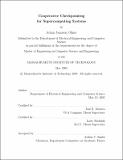| dc.contributor.advisor | José E. Moreira. | en_US |
| dc.contributor.author | Oliner, Adam Jamison | en_US |
| dc.contributor.other | Massachusetts Institute of Technology. Dept. of Electrical Engineering and Computer Science. | en_US |
| dc.date.accessioned | 2006-03-28T19:51:36Z | |
| dc.date.available | 2006-03-28T19:51:36Z | |
| dc.date.copyright | 2005 | en_US |
| dc.date.issued | 2005 | en_US |
| dc.identifier.uri | http://hdl.handle.net/1721.1/32102 | |
| dc.description | Thesis (M. Eng.)--Massachusetts Institute of Technology, Dept. of Electrical Engineering and Computer Science, 2005. | en_US |
| dc.description | This electronic version was submitted by the student author. The certified thesis is available in the Institute Archives and Special Collections. | en_US |
| dc.description | Includes bibliographical references (p. 91-94). | en_US |
| dc.description.abstract | A system-level checkpointing mechanism, with global knowledge of the state and health of the machine, can improve performance and reliability by dynamically deciding when to skip checkpoint requests made by applications. This thesis presents such a technique, called cooperative checkpointing, and models its behavior as an online algorithm. Where C is the checkpoint overhead and I is the request interval, a worst-case analysis proves a lower bound of (2 + [C/I])-competitiveness for deterministic cooperative checkpointing algorithms, and proves that a number of simple algorithms meet this bound. Using an expected-case analysis, this thesis proves that an optimal periodic checkpointing algorithm that assumes an exponential failure distribution may be arbitrarily bad relative to an optimal cooperative checkpointing algorithm that permits a general failure distribution. Calculations suggest that, under realistic conditions, an application using cooperative checkpointing may make progress 4 times faster than one using periodic checkpointing. Finally, the thesis suggests an embodiment of cooperative checkpointing for a large-scale high performance computer system and presents the results of some preliminary simulations. These results show that, in extreme cases, cooperative checkpointing improved system utilization by more than 25%, reduced bounded slowdown by a factor of 9, while simultaneously reducing the amount of work lost due to failures by 30%. This thesis contributes a unique approach to providing large-scale system reliability through cooperative checkpointing, techniques for analyzing the approach, and blueprints for implementing it in practice. | en_US |
| dc.description.statementofresponsibility | by Adam Jamison Oliner. | en_US |
| dc.format.extent | 94 p. | en_US |
| dc.format.extent | 2455146 bytes | |
| dc.format.extent | 2616682 bytes | |
| dc.format.mimetype | application/pdf | |
| dc.format.mimetype | application/pdf | |
| dc.language.iso | eng | en_US |
| dc.publisher | Massachusetts Institute of Technology | en_US |
| dc.rights | M.I.T. theses are protected by copyright. They may be viewed from this source for any purpose, but reproduction or distribution in any format is prohibited without written permission. See provided URL for inquiries about permission. | en_US |
| dc.rights.uri | http://dspace.mit.edu/handle/1721.1/7582 | |
| dc.subject | Electrical Engineering and Computer Science. | en_US |
| dc.title | Cooperative checkpointing for supercomputing systems | en_US |
| dc.type | Thesis | en_US |
| dc.description.degree | M.Eng. | en_US |
| dc.contributor.department | Massachusetts Institute of Technology. Department of Electrical Engineering and Computer Science | |
| dc.identifier.oclc | 62323950 | en_US |
